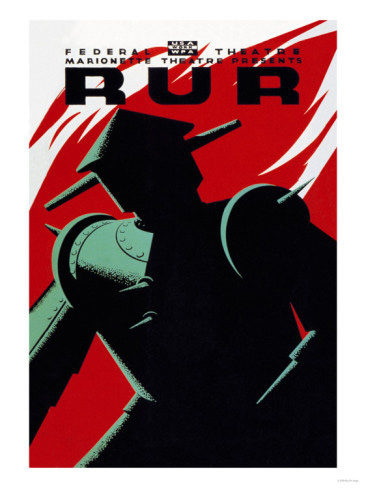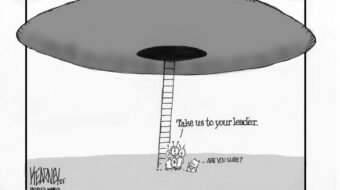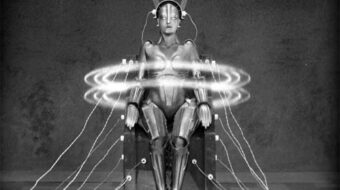
On the June 25, 1921 premier, Czech author Karel Capek’s introduced the term robot in his science fiction play R.U.R. in which robots organize and rebel against poor working conditions and low pay.
R.U.R. stands for Rossum’s Universal Robots, an English phrase used as the subtitle in the Czech original
The play introduced the word “robot” to the English language and to science fiction as a whole. Robot displaced older words such as “automaton” or “android” in languages around the world. In its original Czech, robota means forced labor of the kind that serfs had to perform on their masters’ lands, and is derived from rab, meaning “slave.”[
R.U.R. quickly became famous and by 1923, it had been translated into thirty languages.
The play begins in a factory that makes artificial people, made of synthetic organic matter, called “robots.”
Unlike the modern usage of the term, these creatures are closer to the modern idea of cyborgs or even clones, as they can be mistaken for humans and can think for themselves and organize a robot rebellion.
The work premiered in Prague in 1921. It was translated from Czech into English and adapted for the English stage in April 1923 in London.
The play’s American première was in New York City in October 1922, where it ran for 184 performances. It also played in Chicago and Los Angeles during 1923. In the late 1930s, the play was staged in the U.S. by the Federal Theatre Project’s Marionette Theatre in New York.
Isaac Asimov, author of the Robot series of books and creator of the Three Laws of Robotics, stated: “Capek’s play is, in my own opinion, a terribly bad one, but it is immortal for that one word. It contributed the word ‘robot’ not only to English but, through English, to all the languages in which science fiction is now written.”
Photo WPA Marionette Theater RUR poster. Public domain.










